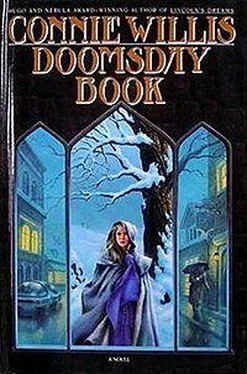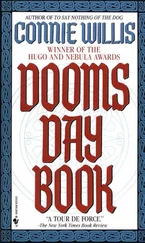It must be the steward's house. There were two rooms, separated by a timbered partition, and matting on the floor. The table was bare, and the fire on the hearth had been out for days. The little room was filled with the smell of cold ashes. The steward and his family had fled, and perhaps the rest of the villagers, too, no doubt taking the plague with them. And Kivrin.
He leaned against the door jamb, the tightness in his chest suddenly a pain again. Of all his worries over Kivrin, this one had never occurred to him, that she would have gone.
He looked into the other room. Colin ducked his head in the door. "The horse keeps trying to drink out of a bucket that's out here. Should I let it?"
"Yes," Dunworthy said, standing so Colin couldn't see round the partition. "But don't let him drink too much. He hasn't had any water for days."
"There isn't all that much in the bucket." He looked round the room interestedly. "This is one of the serf's huts, right? They really were poor, weren't they? Did you find anything?"
"No," he said. "Go and watch the horse. And don't let him wander off."
Colin went out, brushing his head against the top of the door.
The baby lay on a bag of flocking in the corner. It had apparently still been alive when the mother died; she lay on the mud floor, her hands stretched out toward it. Both were dark, almost black, and the baby's swaddling clothes were stiff with darkened blood.
"Mr. Dunworthy!" Colin called, sounding alarmed, and Dunworthy jerked around, afraid he had come in again, but he was still out with the stallion, whose nose was deep in the bucket.
"What is it?" he asked.
"There's something over there on the ground." Colin pointed toward the huts. "I think it's a body." He yanked on the stallion's reins, so hard the bucket fell over and a thin puddle of water spilled out on the snow.
"Wait," Dunworthy said, but he was already running forward into the trees, the stallion following.
"It is a b — " Colin said, and his voice cut off sharply. Dunworthy ran up, holding his side.
It was a body, a young man's. It lay sprawled face up in the snow in a frozen puddle of black liquid. There was a dusting of snow on his face. His buboes must have burst, Dunworthy thought, and looked at Colin, but he was not looking at the body, but at the clearing.
It was larger than the one in front of the steward's house. At its edges lay half a dozen huts, at the far end the Norman church. And in the center, on the trampled snow, lay the bodies.
They had made no attempt at burying them, though by the church there was a shallow trench, a mound of snow-covered dirt piled beside it. Some of them seemed to have been dragged to the churchyard — there were long, sled-like marks in the snow-and one at least had crawled to the door of his hut. He lay half-in, half-out.
"'Fear God,'" Dunworthy murmured, "'for the hour of His judgment is come.'"
"It looks like there was a battle here," Colin said.
"There was," Dunworthy said.
Colin stepped forward, peering down at the body. "Do you think they're all dead?"
"Don't touch them," Dunworthy said. "Don't even go near them."
"I've had the gamma globulin," he said, but he stepped back from the body, swallowing.
"Take deep breaths," Dunworthy said, putting his hand on Colin's shoulder. "And look at something else."
"They said in the book it was like this," he said, staring determinedly at an oak tree. "Actually, I was afraid it might be a good deal worse. I mean, it doesn't smell or anything."
"Yes."
He swallowed again. "I'm all right now." He looked round the clearing. "Where do you think Kivrin's likely to be?"
Not here, Dunworthy prayed.
"She might be in the church," he said, starting forward with the stallion again, "and we need to see if the tomb's there. This might not be the village." The stallion took two steps forward and reared his head, his ears back. He whinnied frightenedly.
"Go and put him in the shed," Dunworthy said, taking hold of the reins. "He can smell the blood, and he's frightened. Tie him up."
He led the stallion back out of sight of the body and handed the reins to Colin, who took them, looking worried. "It's all right," he said, leading him toward the steward's house. "I know just how you feel."
Dunworthy walked rapidly across the clearing to the churchyard. There were four bodies in the shallow pit and two graves next to it, covered with snow, the first to die perhaps, when there were still such things as funerals. He went round to the front of the church.
There were two more bodies in front of the door. They lay face-down, on top of one another, the one on top an old man. The body underneath was a woman. He could see the skirts of her rough cloak and one of her hands. The man's arms were flung across the the woman's head and shoulders.
Dunworthy lifted the man's arm gingerly, and his body shifted slightly sideways, pulling the cloak with it. The kirtle underneath was dirty and smeared with blood, but he could see that it had been bright blue. He pulled the hood back. There was a rope around the woman's neck. Her long blonde hair was tangled in the rough fibers.
They hanged her, he thought with no surprise at all.
Colin ran up. "I figured out what these marks on the ground are," he said. "They're where they dragged the bodies. There's a little kid behind the barn with a rope around his neck."
Dunworthy looked at the rope, at the tangle of hair. It was so dirty it was scarcely blonde.
"They dragged them to the churchyard because they couldn't carry them, I bet," Colin said.
"Did you put the stallion in the shed?"
"Yes. I tied it to a beam thing," he said. "It wanted to come with me."
"He's hungry," Dunworthy. "Go back to the shed and give him some hay."
"Did something happen?" Colin asked. "You're not having a relapse, are you?"
Dunworthy didn't think Colin could see her dress from where he stood. "No," he said. "There should be some hay in the shed. Or some oats. Go and feed the stallion."
"All right," Colin said defensively, and ran toward the shed. He stopped halfway across the green. "I don't have to give it the hay, do I?" he shouted. "Can I just lay it down in front of it?"
"Yes, " Dunworthy said, looking at her hand. There was blood on her hand, too, and down the inside of her wrist. Her arm was bent, as though she had tried to break her fall. He could take hold of her elbow and turn her onto her back quite easily. All it required was to take hold of her elbow.
He picked up her hand. It was stiff and cold. Under the dirt it was red and chapped, the skin split in a dozen places. It could not possibly be Kivrin's, and if it were, what had she gone through these past two weeks to bring her to this state?
It would all be on the corder. He turned her hand gently over, looking for the implant scar, but her wrist was too caked with dirt for him to be able to see it, if it was there.
And if it was, what then? Call Colin back and send him for a knife in the steward's kitchen and chop it out of her dead hand so they could listen to her voice telling the horrors that had happened to her? He could not do it, of course, any more than he could turn her body over and know once and for all that it was Kivrin.
He laid the hand gently back next to the body and took hold of her elbow and turned her over.
She had died of the bubonic variety. There was a foul yellow stain down the side of her blue kirtle where the bubo under her arm had split and run. Her tongue was black and so swollen it filled her entire mouth, like some ghastly, obscene object thrust between her teeth to choke her, and her pale face was swollen and distorted.
It was not Kivrin. He tried to stand, staggering a little, and then thought, too late, that he should have covered the woman's face.
Читать дальше












